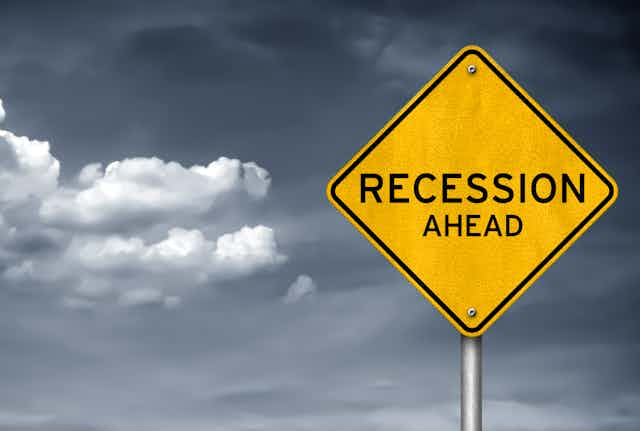Although it certainly feels like it, and many people believe it, we are not in a recession yet. While a recession is defined as two successive quarters of negative GDP growth, it is essentially a period where economic growth falls significantly and unemployment rates rise.
Given the lack of a precise definition, there is not always a full agreement on whether an economy is in recession. In Canada, the government has not made any recent declarations of recessions, but the C.D. Howe Institute, a Canadian nonprofit policy research organization, tracks recessions independently.
According to the Institute, the most recent recession started in March 2020 during the height of COVID-19’s first wave. The Institute declared the recession over in August 2021. The current cost of living crisis has many Canadians wondering when the next one will be.
Runaway inflation
The general consensus among economists is that a recession is likely to occur sometime in 2023. This expectation is largely because of the aggressive interest rates that central banks around the world have increased to combat inflation.
Inflation rates — the rate of growth in prices we pay for goods and services — have risen to levels not seen in four decades. High inflation rates negatively impact purchasing power and make it more difficult for people to buy everyday necessities, like groceries. Inflation also has a negative impact on economic efficiency, resulting in overall decreased growth.

When interest rates rise, it becomes more expensive to finance the purchase of larger items, like cars, homes and vacations. Any purchase that requires financing becomes more costly when interest rates rise.
When existing debts have variable interest rates, the cost to carry these debts also increases. As a result of these increases, demand for many goods and services lessen, and so does inflation.
What happens in a recession?
During a recession, businesses are forced to reduce hiring, lay off workers and reduce working hours. If a recession does hit, tens of thousands of Canadians will become unemployed, or have reduced working hours.
Many of these job losses will be concentrated in the service sector, particularly in the gig economy where incomes tend to be lower and employment is precarious.

A loss in income means people have to draw on their savings — assuming they have any — to pay for essential items such as food, shelter and transportation. The potential of job losses or reduced hours of work is, therefore, the greatest impact of a recession and the consequence most people should prepare for.
How to prepare
With a recession seeming imminent, many Canadians are rightfully concerned about the state of their finances. In anticipation of a recession, here are six tips Canadians can follow to prepare for a recession:
Reduce spending, particularly spending on non-essential items, immediately. Take the opportunity to review your budget and reconsider daily spending habits that add up. Rather than buying lunch each day, consider packing a lunch. Reconsider those subscriptions that automatically come out of your account each month. It’s a great time to rationalize and justify your spending habits and reconsider budgets.
Pay off your credit card debt now. It’s important to pay down high-interest debt as much as possible, as soon as possible. Over the coming months, interest rates will continue to rise, making it harder to manage debts. Lower balances allow a lower level of interest payments during any period of lost income or employment, thus making it easier to navigate financially difficult periods.
Pay close attention to bill payments and avoid paying late charges. These charges also add up over time. Make a plan to ensure bill payments are paid on or before the due date. Paying bills late results in monetary penalties, which you always want to avoid, but especially during a recession.
Be prepared to lose your job. Ensure your resumes and cover letters are up-to-date and you are prepared to job hunt. In the event of a job loss, be ready to find another job at a moment’s notice.
Become more hireable. Because recessions typically hit those with less experience and lower skills harder, you should keep job-related skills up-to-date. Explore virtual options that provide excellent opportunities for upgrading, or in-person offerings through colleges and universities across the country, to further your education and skills development.
If possible, try to move into a recession-proof job. The most recession-proof jobs depend on skill levels, but tend to be in the government sector, health care and within education. Of course, these jobs are not for everyone. Each person should consider options that are conducive to their skill set and preferences. This strategy is far more successful when skills and resumes are updated, and you are well prepared.

Plan for the worst, hope for the best
Some of these strategies are easier to pursue than others. But perhaps the biggest lesson of all is to always be prepared for the worst. Recessions, or economic downturns, are part of what is called the business cycle, which describes the ups and downs of the economy. Recessions typically occur once every decade and sometimes more often.
Individuals should always be well prepared for such downturns. It’s much easier to pursue the strategies above well in advance of a recession, instead of waiting until the last moment. The closer to a recession someone tries to pursue the above strategies, the more difficult it is to be well prepared.
Even if you plan ahead, recessions can be terrifying to live through. But the good news is recessions don’t last forever. The only thing we can do is plan for the worst and hope for the best.


